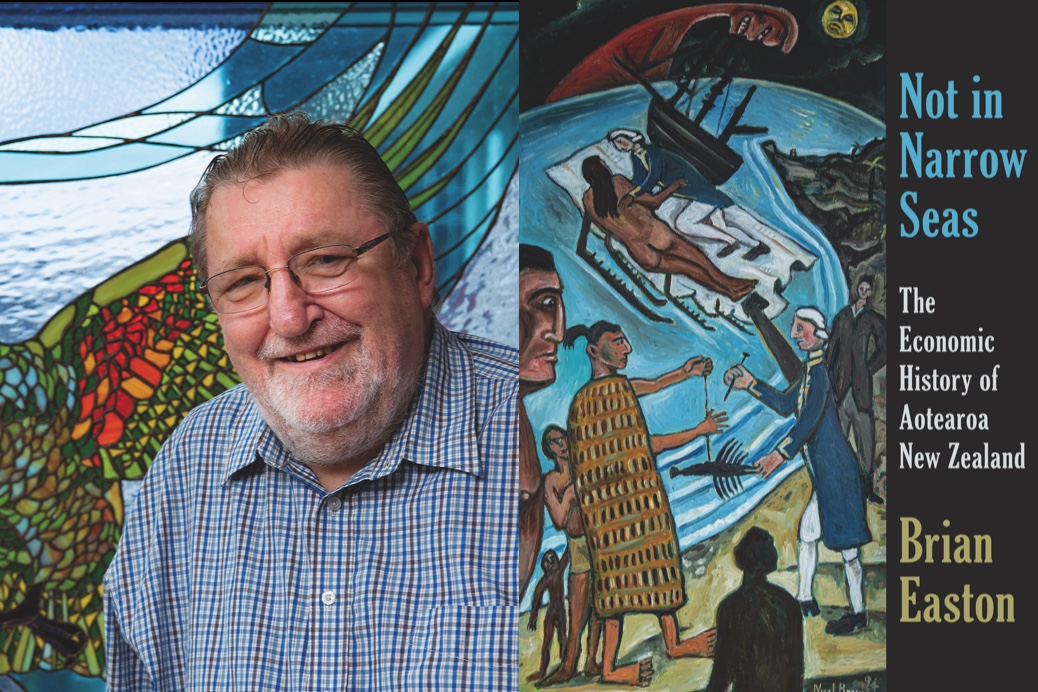New Zealand is still trying to regain its egalitarian identity after the harsh economic reforms of the 1980s and 1990s, according to veteran economist Brian Easton.
Easton says the economic reforms led by former finance ministers Roger Douglas and Ruth Richardson caused the only example of self-inflicted economic stagnation in his thorough history of the New Zealand economy. Easton writes that other examples of economic recession in New Zealand were attributed to "external circumstances" such as the Great Depression or the wool-price crash.
Brian Easton discusses Not in Narrow Seas: The Economic History of Aotearoa New Zealand with historian Geoffrey Rice at The Piano in central Christchurch at 10.30am on Saturday 31 October.
Easton analyses the Māori economy before the arrival of European settlers and chronologically takes his reader through settlement, land wars, the Great Depression, both world wars, the stockmarket crash, the Canterbury earthquakes and assesses the impacts on New Zealand's back-pocket.
Not in Narrow Seas presents chapters on the rural to city migration, the experience of different ethnic groups and changing gender roles in 20th century New Zealand so offers plenty of social, as well as economic, insights.
Because of Easton's thorough approach, this book is an engrossing history of New Zealand, not just the economy. Amongst the historical nuggets is that only two New Zealanders were receiving the unemployment benefit in 1952 and the chain of events that led to the adoption of MMP was started in 1987 by Prime Minister David Lange stumbling over his notes and mistakenly pledging a referendum on electoral systems.
Easton tracks the development of New Zealand's welfare state. By listing former Prime Minister Sir Michael Savage's description, "applied Christianity", Governor Grey's 19th assessment, "anti-Christian", and former Prime Minister Sidney Holland's dismissive dig, "applied lunacy", Easton shows the rhetorical battle over "social security" is not just a modern debate.
Speaking of rhetoric, Easton depicts former Prime Minister Sir Robert Muldoon as a political pugilist who hid his softer side. This enables Easton to explain Muldoon's appeal to his core supporters, AKA "Rob's mob" while assessing the economic impact of Muldoon's wide-ranging interventions.
Easton is at his most critical when assessing the neo-liberal reforms of Douglas and Richardson, despite offering three different assessments of the reforms. Easton writes that between 1986 and 1993 New Zealand's economy stagnated during "strong international economic growth" but acknowledges New Zealand might still have been adjusting to the wool-price crash of the 1970s. Easton concludes that the "Rogernomics Stagnation" still carries some responsibility for New Zealand losing pace with its OECD contemporaries including Australia.
In his chapter, 'An Egalitarian Society?', Easton writes that the substantial tax cuts of Rogernomics boosted the wealthy but were paid for by reducing incomes at the bottom - "a reversal from ... egalitarianism .... to anti-egalitarianism". He is sceptical that the Jacinda Ardern-led government is "transformational", writing that the "notion was never elaborated" and that the Ardern government "gave important jobs to former neoliberal enthusiasts".
Not in Narrow Seas wraps up pre-Covid with the Christchurch Mosque attacks and climate change protests of 2019 mentioned. To catch Easton's views on how Covid-19 has affected New Zealand's economy head to interest.co.nz.




Add a comment to: WORD Christchurch: Economist counts the cost of Rogernomics